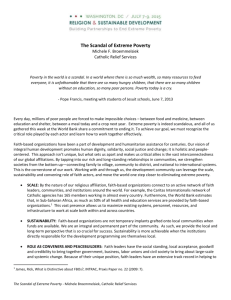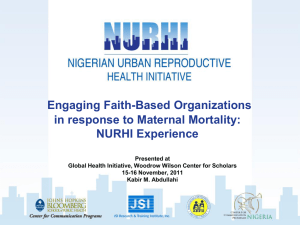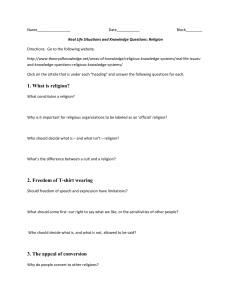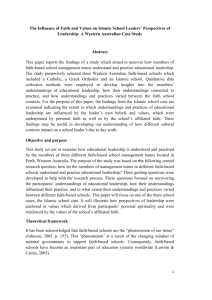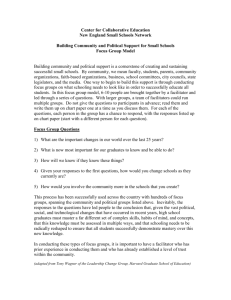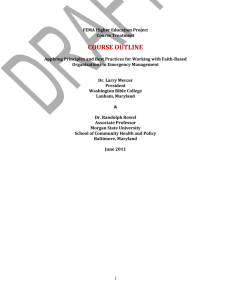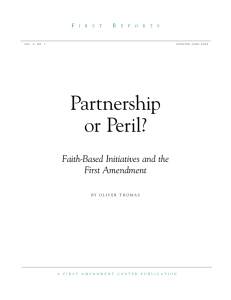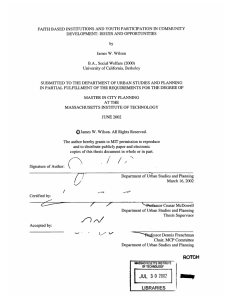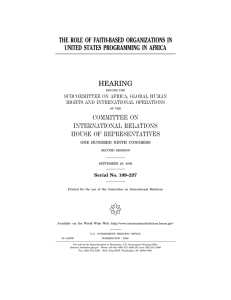Nonprofit and Voluntary Sector Quarterly Volume 42, Issue 3, June
advertisement
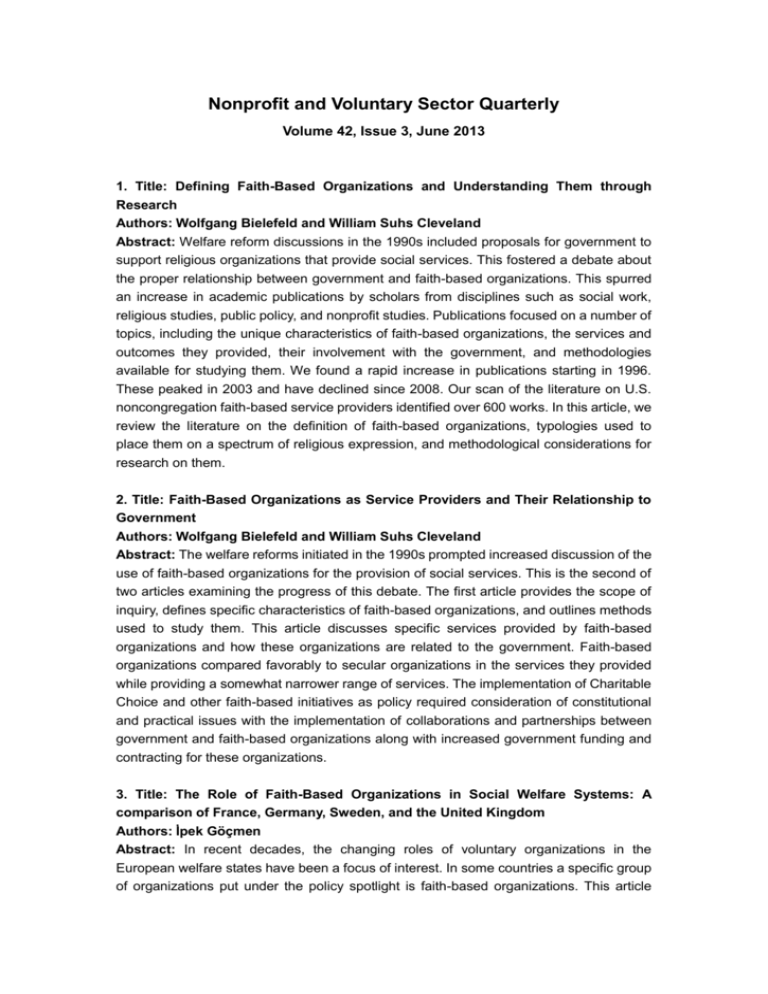
Nonprofit and Voluntary Sector Quarterly Volume 42, Issue 3, June 2013 1. Title: Defining Faith-Based Organizations and Understanding Them through Research Authors: Wolfgang Bielefeld and William Suhs Cleveland Abstract: Welfare reform discussions in the 1990s included proposals for government to support religious organizations that provide social services. This fostered a debate about the proper relationship between government and faith-based organizations. This spurred an increase in academic publications by scholars from disciplines such as social work, religious studies, public policy, and nonprofit studies. Publications focused on a number of topics, including the unique characteristics of faith-based organizations, the services and outcomes they provided, their involvement with the government, and methodologies available for studying them. We found a rapid increase in publications starting in 1996. These peaked in 2003 and have declined since 2008. Our scan of the literature on U.S. noncongregation faith-based service providers identified over 600 works. In this article, we review the literature on the definition of faith-based organizations, typologies used to place them on a spectrum of religious expression, and methodological considerations for research on them. 2. Title: Faith-Based Organizations as Service Providers and Their Relationship to Government Authors: Wolfgang Bielefeld and William Suhs Cleveland Abstract: The welfare reforms initiated in the 1990s prompted increased discussion of the use of faith-based organizations for the provision of social services. This is the second of two articles examining the progress of this debate. The first article provides the scope of inquiry, defines specific characteristics of faith-based organizations, and outlines methods used to study them. This article discusses specific services provided by faith-based organizations and how these organizations are related to the government. Faith-based organizations compared favorably to secular organizations in the services they provided while providing a somewhat narrower range of services. The implementation of Charitable Choice and other faith-based initiatives as policy required consideration of constitutional and practical issues with the implementation of collaborations and partnerships between government and faith-based organizations along with increased government funding and contracting for these organizations. 3. Title: The Role of Faith-Based Organizations in Social Welfare Systems: A comparison of France, Germany, Sweden, and the United Kingdom Authors: İpek Göçmen Abstract: In recent decades, the changing roles of voluntary organizations in the European welfare states have been a focus of interest. In some countries a specific group of organizations put under the policy spotlight is faith-based organizations. This article undertakes a historical-institutionalist analysis of faith-based organizations in France, Germany, Sweden, and the United Kingdom. The article explores the contemporary social welfare roles of faith-based organizations in these countries through studying the institutionalization of religion and the voluntary sector in the sphere of social welfare since the time of national revolutions. The comparative analysis shows that neither the extent of change in the position of faith-based organizations in social welfare, nor the main mechanisms triggering change, is the same for the different welfare states. 4. Title: Comparing Stewardship across Faith-Based Organizations Authors: Jo Anne Schneider Abstract: Nonprofits theory on the role of organizational context focuses on generalizing principles such as neoinstitutionalism and institutional isomorphism. Organizational culture theory focuses on internal organizational culture, ignoring the larger community culture that influences nonprofit behavior. Relying on anthropological understandings of culture as comprising both the values and symbols of a community and its structures and practices, this article describes three support systems for faith-based nonprofits that come out of founding religious traditions. Using comparative case studies across 81 faith communities and FBOs in the United States, research suggests that systems are generalizable across religions and localities, but they come out of specific religious cultures adapted to fit the U.S. system. 5. Title: Faith-Based Umbrella Organizations: Implications for Religious Identity Authors: Patricia A. Wittberg Abstract: Little research has been done on the role of umbrella organizations in affecting how faith-based organizations (FBOs) relate to their sponsoring faith community. Using interviews, archival historical data, and ethnographic observations compiled between 2004 and 2008 by the Faith and Organizations Project, this article applies previous typologies for secular nonprofit umbrella organizations to faith-based umbrellas and outlines some of the benefits and liabilities that these umbrella organizations pose for both faith communities and their local FBOs. 6. Title: Unintended Consequence of the Faith-Based Initiative: Organizational Practices and Religious Identity Within Faith-Based Human Service Organizations Authors: Jill Witmer Sinha Abstract: The faith-based initiative announced in 2001 was accompanied by media coverage, new funding mechanisms, and state-level policies requiring the inclusion of faith-based organizations (FBOs) in Requests for Proposals. This study examined 33 organizations’ expression of religious identity through (a) proportion of board and (b) staff who were coreligionist; (c) change in proportion of revenues from public sources; (d) strategies for seeking resources; and (e) religious elements in service provision, staff training, and board meeting procedures. Interview transcripts from the Faith and Organizations Project, annual reports, and financial information were examined. Analysis suggested four patterns (no change, increased government funding related to the faith-based initiative, strategies for seeking resources, and active preservation of religious identity). Four African American organizations received funding connected to the faith-based initiative and 14 utilized or preserved religious identity. Faith-based policies are discussed as inadvertently affirming organizational distinctiveness and religious identity among some faith-based organizations. 7. Title: Hands in the Pockets of Mercurial Donors: NGO Response to Shifting Funding Priorities Authors: Khaldoun AbouAssi Abstract: The NGO–donor relationship is especially volatile. NGOs in developing countries heavily rely on foreign donor funding and donor dominance is evident. This article explores the relationship at times when donors revise funding priorities and partner NGOs try to adapt. The article draws on qualitative research of multiple observations to study the decisions of four NGOs in response to several shifts in donor funding. The analysis reveals variation in NGO responses to such shifts: suspend the relationship, reach common ground, automatically execute the donor’s interests, and voluntarily and deliberately adapt to the situation. Building on Hirschman’s typology, four modes of NGOs’ response are identified: exit, voice, loyalty, and, a newly proposed mode, adjustment. Additional interpretation of NGOs’ responses and possible implications for NGO management are discussed. 8. Title: Founding New Nonprofit Organizations: Syndrome or Symptom? Authors: Joanne G. Carman and Rebecca Nesbit Abstract: In this study, the authors explore how the dynamics associated with the founding of new nonprofit organizations, the characteristics of the founders, and the developmental life cycles of nonprofit organizations contribute to the seemingly fragmented landscape of the nonprofit sector. Based on data collected from interviews with 31 nonprofit organizations, we find that new nonprofits are being created by passionate, entrepreneurial individuals who hope to make a difference in the community. Although these organizations are typically small, with few staff members and small budgets, the extent to which they rely on volunteers and are connected to the broader community varies considerably. Moreover, many founders had little experience volunteering or working in the sector. The findings from this study have important implications for the professional development of nonprofit staff, leaders, and volunteers, and they shed new light on how we think about and describe the founders of nonprofit organizations. 以下是书评: 9. Title: Civic Engagement in Postwar Japan: The Revival of a Defeated Society, by R. Kage Authors: David C. Hammack Abstract: The article reviews the book “Civic Engagement in Postwar Japan: The Revival of a Defeated Society,” by Kage, R. 10. Title: The Volunteer Management Handbook: Leadership Strategies for Success, by T.D. Connors Authors: Marne Bariso Abstract: The article reviews the book “The Volunteer Management Handbook: Leadership Strategies for Success (2nd ed.),” by Connors, T. D. 11. Title: The Science of Giving: Experimental Approaches to the Study of Charity, by D.M. Oppenheimer and C.Y. Olivola Authors: Wesley E. Lindahl Abstract: The article reviews the book “The Science of Giving: Experimental Approaches to the Study of Charity,” by Oppenheimer, D. M. and Olivola, C. Y.
